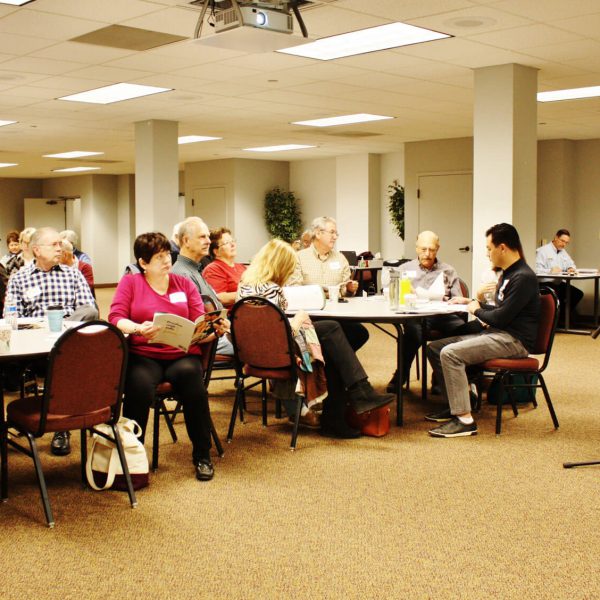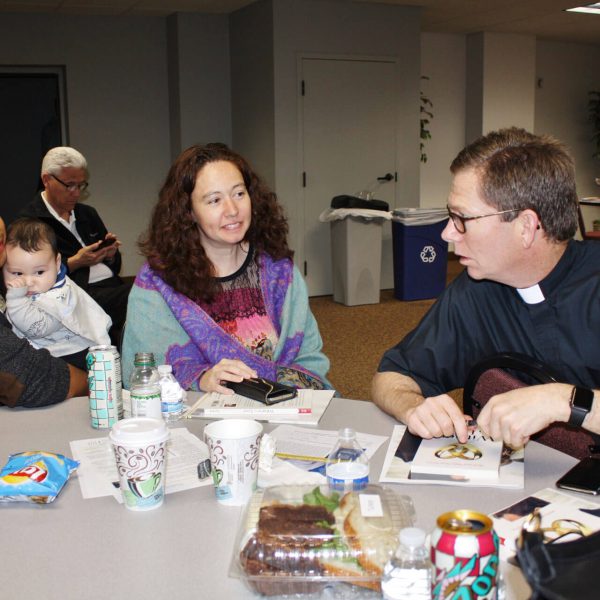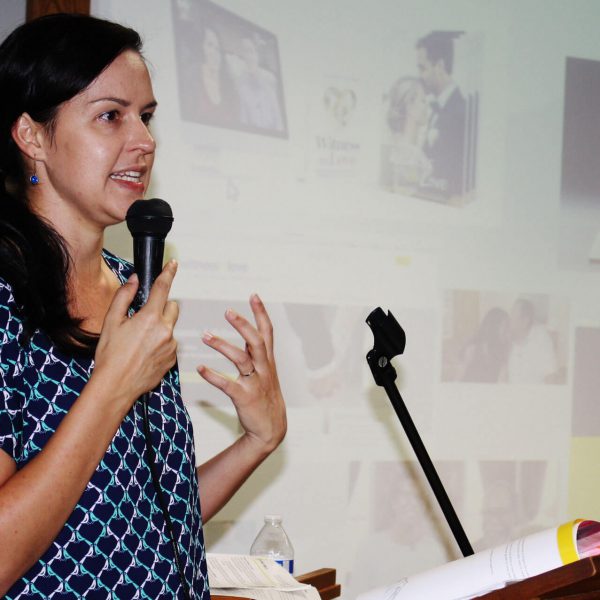SAN DIEGO — “People today believe most marriages end in divorce. Why would anyone ever get married?”
Mary-Rose Verret asked that question before a room packed with priests, deacons and lay marriage ministers at the diocesan Pastoral Center recently.
In the general U.S. population, between 40 to 50 percent of marriages end in divorce. The rate is 28 percent among Catholics, according to the Center for Applied Research in the Apostolate (CARA).
There’s another grim statistic to consider: Only 23 percent of Catholics in the U.S. attended weekly Mass in 2017, down from 55 percent in 1965, the center reported.
Verret and her husband, Ryan, founded a marriage preparation program in 2012, called Witness to Love, which confronts these trends head on. It’s been adopted by 70 dioceses in the United States — with the Diocese of San Diego being the latest — and in Canada, the Philippines and Australia. It’s been translated into Spanish, and versions in French and Vietnamese are on the way.
The impact of such a program can take years to be known but initial numbers are impressive. All the parishes that have implemented it have lowered their divorce rate by double digits and increased church attendance, the couple said.
Locally, the new program is a key way to strengthen parishes to become centers of family life, one of the principal goals of the historic synod held at the diocese in 2016.
The Verrets, who are based in Louisiana, recently conducted the training at the diocese for 230 priests, deacons and lay marriage ministers. Mary-Rose Verret told them that marriage prep is too often “cold and focused on paperwork” rather than giving the couples the skills and support to sustain their relationship, what Witness to Love aims to do.
The couple developed the program in consultation with experts in psychology, theology, marriage prep and evangelization. They interviewed more than 500 engaged and newly married couples in their work at the Diocese of Lafayette and their home parish of St. Joseph. And they have been married for 13 years and have four children.
The heart of the program is building trust.
“Young people today do not trust the Church, institutions, experts or authority,” Verret said. “They trust Google and Siri.”
To begin to build that trust, the program calls for the engaged couple to select a married couple to become their mentors as they prepare for wedded life. It’s analogous to the catechumenate model in faith formation. The two couples complete six units together before the wedding, using an easy-to-follow online guide and workbook. Each unit focuses on key virtues and how to practice them, including respect, courage, honor, love, forgiveness, kindness and endurance.
The mentors share their life with the engaged couple, including the problems they encountered in their relationship and how they overcame them. After the wedding, the mentor couple is there as the newlyweds embark on their life together, with its inevitable ups and downs.
The mentor couple is required to have been married at least five years, have a marriage both engaged members look up to, attend church regularly and be active in the parish. They cannot be family members.
“The mentors are not expert counselors or theologians,” she said. “They offer a lifeline of support for the couple after the wedding day.”
This relationship changes the very conversation engaged couples have as they prepare to get married, she said.
“We go from ‘This is what you have to do’ to ‘This is what you get to do.’”
The diocese’s program still includes traditional steps, such as working with the marriage prep minister, taking the FOCCUS Inventory, and attending an Engaged Encounter weekend or diocesan retreat day for faith formation catechesis.
The mentor couples play a pivotal role in connecting the newlyweds to the parish, which can revive the congregation, she said. She cited what happened at her own parish after the program was implemented.
“Every year, instead of losing people, we had new couples starting to go to church,” she said. “Then they were bringing their kids. All of a sudden, the church went from being half-full to standing room only.”
She stressed how powerful a good marriage can be, and how rare they are, noting that only 7 percent of Catholic couples say they are happily married.
“The witness of one good marriage touches countless lives, transforms parishes, communities and is a shining beacon in a hurried world,” affirmed Verret.
The benefits of the program extend beyond the engaged couple.
“We hear from mentor couples that this is the marriage preparation they never received,” she said, adding that the program “is a two-for-one evangelization effort.”
The program’s elements sounded familiar to Deacon Salvador Huitrón, from Our Lady of Refuge Parish in Pacific Beach, who participated in the training.
In the Mexican culture, “we have ‘padrinos’ [godparents] who basically are responsible for guiding the engaged couple through the wedding process and afterward, counseling them,” said the deacon, a native of Mexico. He welcomed being able to offer the new program at his parish.
After the trainings, John Prust, the diocese’s associate director for Engaged & Newly Married Couples, said the reaction to the program “was overwhelmingly positive.” He said all participants recognized the importance of couples mentoring other couples and were excited to try it at their parishes.
Several have begun to lay the foundation to implement the program, such as at The Immaculata, while others have already launched it, adapting it to their own needs. It’s hoped that most parishes will adopt the program in the next couple of years.
About 110 weddings a year are celebrated at The Immaculata, said its pastor, Father Matthew Spahr. The parish has assembled a team to implement the program. The team introduced the concept to parishioners in March, and one engaged couple has already selected their mentor couple and begun the program.
Father Spahr said he was surprised at how the couples he has talked to so far “didn’t even blink an eye when I told them about selecting a mentor couple. I thought they might ask, ‘Where are we going to find someone?’ They welcomed it.”
One challenge he sees is that the couples in the pews need to be empowered to think of themselves as potential mentors. He said that most people think, “I’m not qualified to do that.”
“They do not have to have a perfect marriage,” he said. “It’s about walking with these couples.”
Father Spahr has been preparing couples to marry for the 26 years he has been a priest.
“What feels right, and different and good about this program is the greater involvement of married couples. Who better to prepare couples for marriage than married couples who are living that vocation? And who better to mentor them in being involved in the life of the Church than those who are doing it?”
That’s the premise of Witness to Love, said its co-founder, Mary-Rose Verret.
“We’re introducing a culture where love is revealed, supported and lived.”
For more information, visit witnesstolove.org or contact John Prust at jprust@sdcatholic.org. Engaged couples also are invited to ask about it at their parishes.






